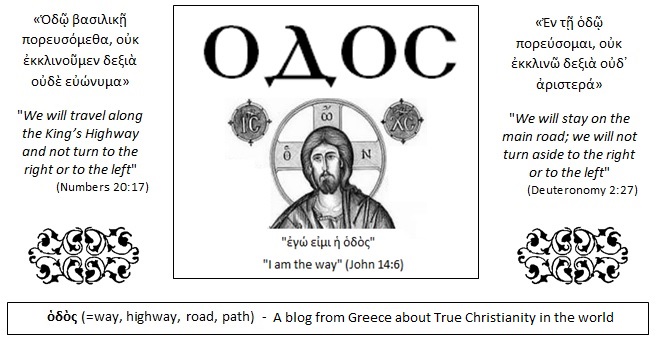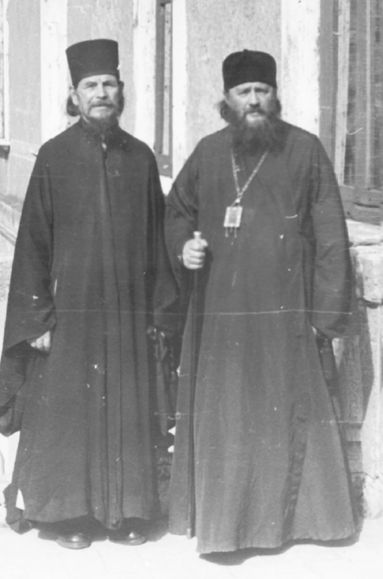Archbishop Leonty (+1971) and the Greek Old Calendarists [part 6]
(Continue from here)
Extensive Correspondence with the Greek Strugglers
Throughout the summer of 1962, many letters were exchanged between the Greek strugglers, both clergy and laity, and Archbishop Leonty, whom the Synod of the Genuine Orthodox (in a letter of June 1962) declared "our Leader, Shepherd, and President."
On June 20 and June 21 (old calendar), Archbishop Leonty sends letters to the Synod of Bishops and to Bishop Auxentios of Gardikion, respectively. In the first letter, he refers to the deviation of the official Churches from the middle path of Orthodoxy, with some leaning towards the left (Communists - i.e. Moscow Patriarchate etc.) and others towards the right (Freemasons - i.e. Patriarchates of Constantinople, Antioch etc.). He also highlights the danger of losing the traditional character of ROCOR, as some of its bishops wish to maintain good relations with all Churches, except Moscow, for political reasons. In closing, he emphasizes the necessity of close collaboration between them (ROCOR and GOC), while also referring to the connection between the two persecuted Churches that have much in common: the Russian Catacomb Church and the Greek Old Calendarists (GOC).
In the second letter, he greets Bishop Auxentios of Gardikion and, through him, all those he met during his trip to Greece, emphasizing that he considers the Greek bishops to be the closest to him from a spiritual perspective.
On June 29, he sends a congratulatory letter to Father Petros Astyfides on the occasion of the latter’s nameday celebration, in which he also writes to him about the issue of his consecration as Bishop.
Around that time, Archbishop Leonty received a letter from Bishop Akakios of Diavleia, while on July 7/20, the Archbishop sent two letters, one to Fr. Chrysostomos Kiousis and one to Demetrios Mouratides.
In his letter to Fr. Chrysostomos Kiousis, he urges unity and cooperation among all True Orthodox and presents St. Gregory the Theologian as an example to emulate, who, for the sake of peace and the greatest good of ecclesiastical unity, resigned the episcopal throne of Constantinople. He even emphasizes that "our Genuine Church has no need for rebels or politicians who would separate the 'elect' from the 'nobodies,'" a very important point, especially for us who have witnessed such tendencies from "Purists" emerging within the Old Calendarists from time to time.
In his letter to Mouratides, among other things, he observes that the bishops should cooperate with him [the Archbishop Leonty] and consult with him before making decisions concerning the Church. [1]
Along with this letter, he sends revealing material concerning the Masonic status of the Metropolitan of Heliopolis and Seleucia (Patriarchate of Antioch), Niphon Saba, with the recommendation that it be published [2] in order to inform even the New Calendarists. Archbishop Leonty’s anxiety about the seizure of the episcopal thrones of the Local Churches by enemies of Orthodoxy, whether supporters of Communist regimes (in the Eastern Bloc) or Freemasons (in the "democratic" world), is evident.
Three days later (on July 10/23), Archbishop Leonty wrote a new letter, this time addressed to Constantine Komnios and his wife Maria. In this letter, he asks them to refrain from quarrels and not to complain, thinking that some bishops are unworthy because "if they are not truly as they appear, then the Lord will punish them in the future." He advises them to be united among themselves, all True Orthodox, and to trust in God. At the same time, he expresses his fervent desire to come to our country (Greece) permanently.
In this letter we also read, among other things, the following characteristics against the heresy of Ethno-phyletism: "The Church of Christ is not Greek, it is not Russian, it is not Arab, but Catholic... I have not come to you because you are Greeks, but because you are Orthodox who want to keep the Faith of Christ pure."
On July 22 / August 4, he sends a letter to the Zealot Athonite fathers, George of Provata and Panteleimon Nanopoulos [3] the printer, in which he emphasizes, once again, the importance of love and unity among the True Orthodox, while informing them that there might be a campaign against him by his Synod (ROCOR) regarding the consecrations. However, he writes that he does not regret because in this way Orthodoxy has been strengthened, and he seeks their intercession so that the Greek strugglers can send him statements of support. In this letter, he also expresses his regret for not being able to meet his compatriot Elder Nikodim of Karoulia, and has not heard from him for some time.
Before closing the letter, Archbishop Leonty also mentions the danger of the expulsion, back to Communist Russia, of the Bishops of the Russian Church Abroad. Deportation to Moscow, of course, for the Bishops of ROCOR would mean a death sentence or life in the gulags of Siberia... This must also be taken into account in order to understand the attitude of some towards the official Churches, who feared this outcome, especially if the official Churches were to make a Pan-Orthodox condemnation against them. In this light, Archbishop Leonty’s daring appears even more courageous! Therefore, for the reconstitution of a true Orthodox Hierarchy in times of danger, Archbishop Leonty can be described as a new Theophanes of Jerusalem. [4]
This is exactly how the Zealot Fathers of Mount Athos treated him, who, in response to his letter, thanked him and praised him for the work he had accomplished, stating that they would stand by his side.
NOTES
[1] And St. Nicodemos [the Hagiorite] points out that bishops of each region, without the opinion of their head, “do not to do anything… that does not pertain to the parishes of their diocese, but, extending beyond these limits, have to do with the common condition of the whole province, as, for instance, do questions concerning the dogmas, matters involving adjustments and corrections of common mistakes, the installation and ordination of prelates, and other similar things.” (Interpretation of Apostolic Canon 34). And yes, the bishops had elected Bishop Akakios of Talantion as the "Archbishop and President of the Holy Synod" (Encyclical No. 2/8-6-1962), but they had also declared to Archbishop Leonty that "we consider Your Eminence as our Leader, Shepherd, and President," as we saw earlier.
[2] The material was published in the official magazine of the Church of the Genuine Orthodox of Greece, "The Voice of Orthodoxy" (No. 398/August 6, 1962):
[3] Fr. Panteleimon Nanopoulos (born about 1920), along with his brother, Fr. Theophylact, were disciples of Elder Nektarios Katsarοs, the printer of the Iveron Monastery on Mount Athos. In 1942, they were arrested by the Germans and sent to the concentration camps, from which they were miraculously rescued. Fr. Panteleimon fell asleep in late 1997, just a few days after Fr. George of Provata passed away.
[4] The renowned Patriarch of Jerusalem, Theophanes, following a plan with the Patriarch of Alexandria (and later Constantinople), St. Cyril Lucaris, secretly traveled to Kiev in 1620 and consecrated a new Hierarchy for the Orthodox of the Polish-Lithuanian Commonwealth, replacing the former bishops who had joined the Unia in 1596.
[Be continued].







Σχόλια
Δημοσίευση σχολίου